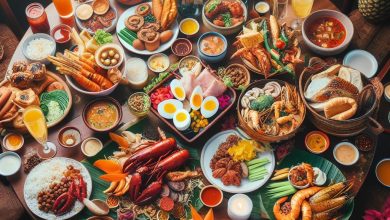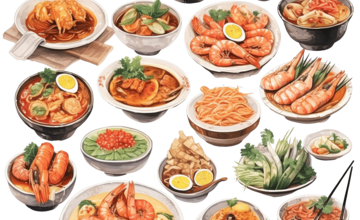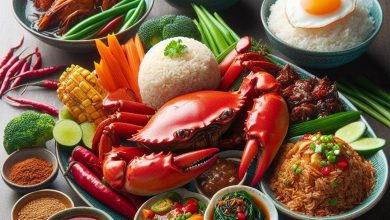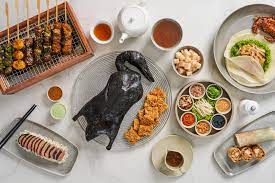Unveiling the Sacred Flavors of Singapore’s Religious Celebrations
Flavors of Singapore's Religious Celebrations

Introduction:
Non-secular vacations in Singapore, a melting pot of cultures and customs, offer possibilities for every religious contemplation and devotion in addition to savoring a severa kind of delicacies and cuisines. Every non-secular party in Singapore is marked with the useful resource of a extraordinary selection of conventional materials that stand for statistics, network, and the ties that bind faith, from the colourful colors of Hindu celebrations to the tranquil placing of Buddhist rituals.
Deepavali: Festival of Lights and Savory Delights
One of the biggest Hindu gala’s determined in Singapore and other additives of the location is Deepavali, popularly known as Diwali. Deepavali is a season of glad celebrations, colourful decorations, and delectable feasts that characterize the victory of slight over darkness and accurate over evil.
The education of traditional Indian goodies and savory substances, called “mithai” and “snacks,” is a characteristic of the Deepavali celebrations. Popular cakes embody “ladoo,” which is probably sweet balls made from flour, sugar, and ghee, “gulab jamun,” which may be deep-fried milk dumplings soaking moist in syrup, and “jalebi,” which may be crispy fried batter sopping moist in syrup laced with saffron.

During Deepavali celebrations, people additionally enjoy savory treats like “murukku,” which may be crispy rice flour snacks, “samosas,” which can be flaky pastry pockets full of particularly spiced meat or potatoes, and “biryani,” that could be a fragrant rice dish cooked with meat and spices. These meals constitute wealth, prosperity, and the thoughts-set of giving amongst pals and family.
Chinese New Year: A Feast for the Senses
For the Chinese populace in Singapore, Chinese New Year, also referred to as Lunar New Year, is a exquisite competition highlighted via using tough customs, colorful décor, and hearty meals. Traditions play a critical position inside the celebrations as families get together to welcome the nice of achievement and greet the contemporary yr.
“Yu sheng,” additionally known as “lo hei” in Cantonese, is a well-known meal this is served at Chinese New Year’s. It is a colorful salad which consist of uncooked fish, shredded veggies, and an abundance of sauces. When the elements are mixed with auspicious phrases and well-dreams, it’s miles said to deliver wealth, fulfillment, and genuine fulfillment for the imminent 12 months.
Famous Chinese New Year elements encompass “jiaozi” (dumplings filled with red meat and veggies), “nian gao” (sticky rice cake signifying boom and prosperity), and “fa cai” (black moss seaweed symbolizing riches and fulfillment). Not most effective are those ingredients first-rate, but similarly they’ve symbolic which means in Chinese subculture, which offers to their enchantment.
Vesak Day: Commemorating the Birth, Enlightenment, and Passing of Buddha
A holy Buddhist vacation called Vesak Day honors the delivery, enlightenment, and lack of existence of Gautama Buddha, the patriarch of Buddhism. Vesak Day is placed in Singapore with somber rituals, colorful processions, and deeds of kindness and charity.
A custom related to Vesak Day is “dana,” this is the act of feeding religious contributors and the underprivileged. In preserving with the Buddhist values of kindness and charity, devotees cook dinner dinner vegetarian food and present them to priests as a sign of recognize and thanks.
Apart from dana, at some point of Vesak Day festivities, vegetarian fare such “lontong” (vegetable curry with compressed rice goodies), “kueh” (steamed or fried snacks crafted from rice flour and coconut milk), and “tang yuan” (sweet glutinous rice balls) are normally supplied. These recipes replicate the significance of conscious ingesting and the Buddhist exercise of compassion for all dwelling matters.
Conclusion:
Religious festivities in Singapore offer not handiest opportunity for spiritual contemplation and devotion, however also for enjoyment of the city’s cultural richness and gastronomic history. These gatherings bring humans together via commonplace elements and gastronomic customs, encouraging a experience of shared identification, belonging, and network.
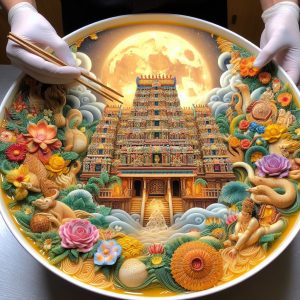
Uncovering the hallowed tastes of Singapore’s non secular festivities gives us a more information of the cultural importance of food and its role in tying us to our historic past, our convictions, and each wonderful. The culinary traditions of non-religious festivities in Singapore, which includes the joyous Deepavali feasts, the symbolic additives of Chinese New Year, and the selfless Vesak Day rituals, provide witness to the range and depth of our multicultural community.


